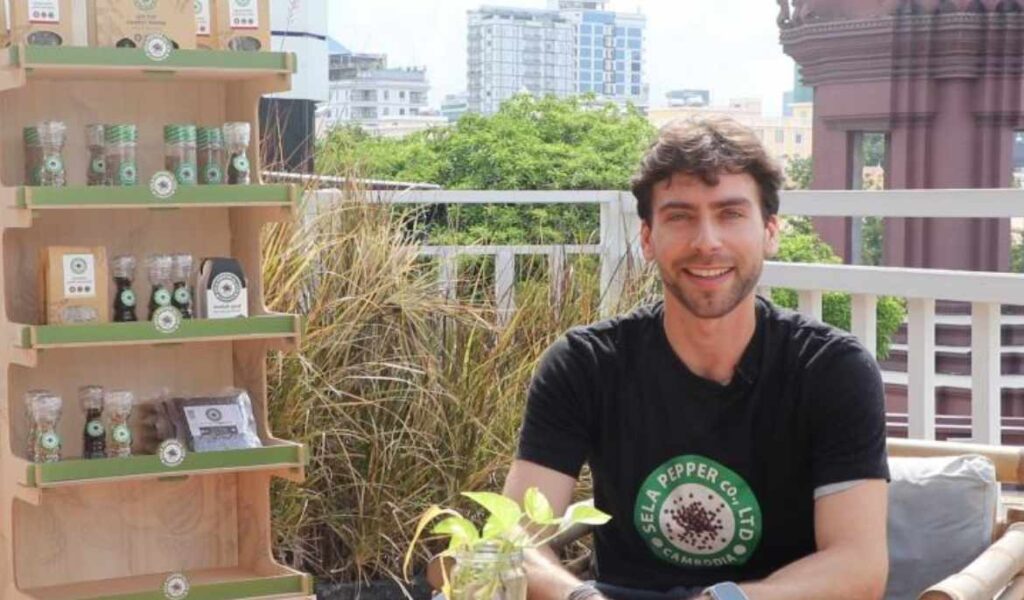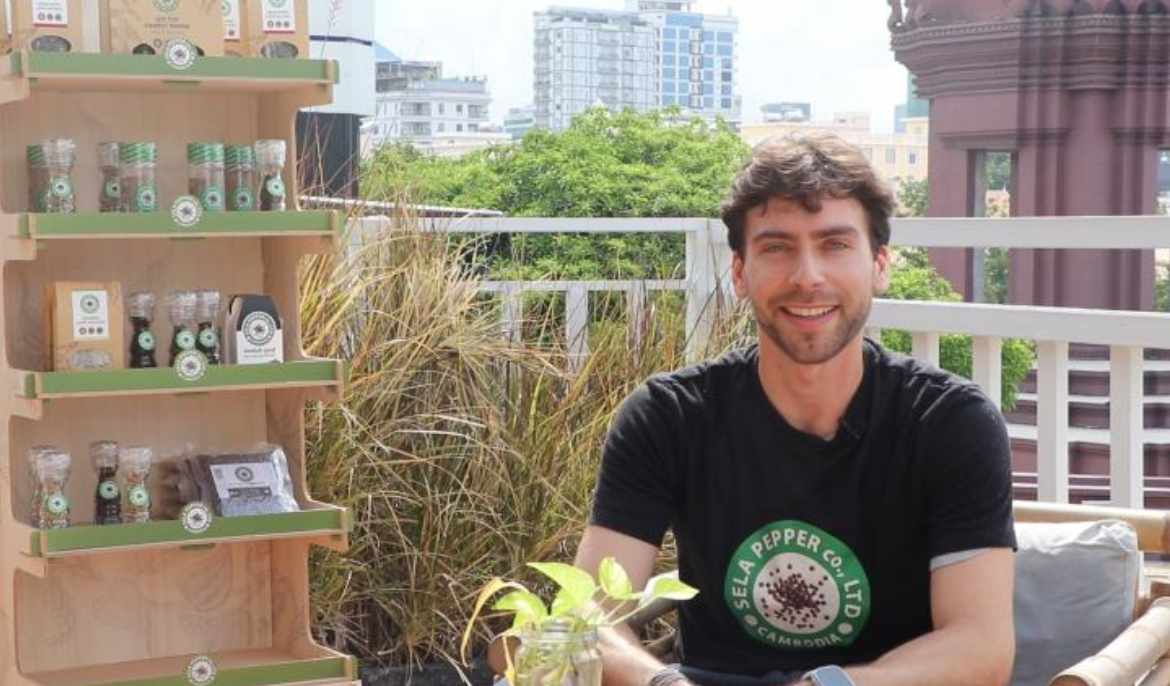This week, EuroCham’s Communications team sat down with Daniel Sela, Marketing and Sales Manager at Sela Pepper Cambodia, to explore what makes Cambodian pepper unique, how the company is transforming the spice sector through sustainability and traceability, and what lies ahead for this ambitious local enterprise.
Stew: To start, could you talk a bit about how you became involved in this industry, and what your journey has been like?
Daniel: I’m Daniel Sela, and I joined the business that my father and his partner founded ten years ago. I gradually became more involved and quickly grew to love Cambodia and the industry we work in. I consider myself lucky to have this opportunity, and I’m grateful for the support of my colleagues, who have helped me grow into the role.
Honestly, no one dreams of becoming a pepper processor as a child, so like many in this field, I’ve had to learn most of the business on the job. It’s a complex and fascinating industry—one that keeps you constantly engaged.
Stew: What makes Cambodian pepper so special, and what are the challenges and opportunities in the agriculture sector?
Daniel: Cambodian pepper—particularly that grown in the Kampot region—is renowned for its exceptionally high quality. This is thanks to the unique combination of geographic and climatic conditions, with the Mekong River, the ocean, and surrounding mountains enriching the soil with vital nutrients. When Kampot received Protected Geographical Indication (PGI) status, it wasn’t just recognition—it was a validation that Cambodia truly holds what many call “black gold.”
That said, Cambodia’s agriculture sector still faces major challenges, particularly around innovation and development. Many SMEs struggle with access to capital, which has historically led farmers to sell their high-quality Cambodian pepper to neighboring Vietnam for processing. It’s also why many producers continue to use conventional methods with heavy pesticides. At Sela Pepper, we work directly with farmers to reverse this trend. By promoting organic farming practices and long-term partnerships, we help them maintain and enhance the quality Cambodia is becoming known for.
Stew: How does Sela Pepper support farmers and ensure quality control?
Daniel: Sela Pepper works with over 600 farmers across the country through contract farming arrangements. Our goal is to help them align with international food safety and ESG (Environmental, Social and Governance) standards. We do this by providing technical support and structured training programs focused on good agricultural practices, integrated pest and disease management, sustainable harvesting, and internal auditing of pesticide use.
This work is reinforced by our modern processing facilities and strict quality control protocols, allowing us to consistently deliver high-quality, traceable pepper that meets the specific needs of global clients. Our entire supply chain—from farm to final product—is monitored and managed in-house, ensuring transparency and trust.
Stew: What challenges do you face as a growing agri-business?
Daniel: Scaling up remains one of our biggest challenges. Cambodia’s pepper sector does not yet operate at a competitive scale, which makes it difficult for us to match prices in some global markets. We also face internal challenges, such as a lack of in-depth market intelligence, and insufficient funding to attend trade fairs or make regular visits to key export markets, especially in Europe.
Despite these challenges, our reputation for quality and authenticity, particularly through Kampot’s PGI status, continues to open important doors.
Stew: What are the current trends in international demand for premium spices?
Daniel: In Western Europe, organic certification has become an industry standard rather than a value-add. This trend is rapidly extending to other markets such as the United States, South Korea, Japan, and more recently, China. To remain competitive and relevant in these markets, suppliers must be able to provide certified organic products.
Although Cambodia struggles with price competitiveness, the Kampot PGI certification has helped us break through market barriers. It gives our product a strong narrative and a premium positioning that resonates well with international buyers.
Stew: Could you share some recent milestones or achievements for Sela Pepper?
Daniel: One major step forward was our admission into the Kampot Pepper Promotion Association (KPPA), which allows us to officially market and sell Kampot Pepper. More recently, we achieved organic certification in China, and during the auditing process, we discovered that we are the first and only certified organic pepper supplier in the Chinese market. This is a significant milestone not only for Sela Pepper but also for Cambodia’s agriculture sector as a whole.
We have since received our first container order of retail products bound for China, and expanding our footprint in that market is now a top priority.
Stew: Who are your key partners, and how do you build trust with them?
Daniel: We’ve established long-term relationships with distributors in Poland, China, Japan, Germany, and South Korea, and we also export in bulk to more than 15 other countries. Our partners value us because we control the entire supply chain and guarantee full traceability. Every bag of Cambodian pepper we ship can be traced back to a specific farm, farmer, and harvest batch.
This traceability starts at the source, with each bulk bag labeled with a unique code before it leaves the farm. Our clients also appreciate our flexibility—we offer customized packaging options ranging from small 17-gram retail packs to large bulk shipments, depending on their needs.
Stew: What leadership lessons have you learned along the way?
Daniel: Working in the pepper industry means balancing two very different worlds: the farming communities we support, and the corporate, export-focused buyers we deal with. The most important lesson I’ve learned is to always support your farmers. Even when prices rise, we make it a point to buy from them. It’s part of our long-term commitment to quality and sustainability.
At the same time, we’re always looking for buyers who understand the value of our product and are willing to pay for excellence. Growth for us means not just scaling our operations, but continuing to develop our people, our partnerships, and our contributions to Cambodia’s economy.
Stew: Any advice for aspiring entrepreneurs, particularly in agriculture?
Daniel: Expect setbacks, and be prepared to keep pushing through them. Perseverance is key. Also, build a team that can communicate effectively, especially in English—it’s critical if you want to scale internationally and form lasting partnerships abroad.



